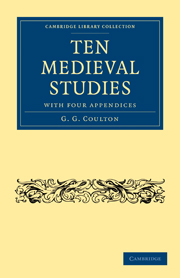Book contents
- Frontmatter
- PREFACE TO FIRST EDITION (1906)
- PREFACE TO SECOND EDITION (1915)
- PREFACE TO THIRD EDITION
- Contents
- I The Monastic Legend
- II A Revivalist of Six Centuries Ago
- III Side-Lights on the Franciscans
- IV The High Ancestry of Puritanism
- V Romanism and Morals
- VI The Truth about the Monasteries
- VII Religious Education before the Reformation
- VIII Priests and People before the Reformation
- IX The Failure of the Friars
- XIII The Plain Man's Religion in the Middle Ages
- Appendices
- Index
I - The Monastic Legend
Published online by Cambridge University Press: 07 September 2010
- Frontmatter
- PREFACE TO FIRST EDITION (1906)
- PREFACE TO SECOND EDITION (1915)
- PREFACE TO THIRD EDITION
- Contents
- I The Monastic Legend
- II A Revivalist of Six Centuries Ago
- III Side-Lights on the Franciscans
- IV The High Ancestry of Puritanism
- V Romanism and Morals
- VI The Truth about the Monasteries
- VII Religious Education before the Reformation
- VIII Priests and People before the Reformation
- IX The Failure of the Friars
- XIII The Plain Man's Religion in the Middle Ages
- Appendices
- Index
Summary
“To manipulate ancient writings, to edit history in one's own favour, did not appear criminal [in the ‘Ages of Faith’] if the end in view were otherwise just and good.”
Dr W. Barry (Papal Monarchy, p. 133).The very thoroughness of the Reformation is, in one sense, its weakness. Modern morals are already so far removed from the medieval, that Anglicans are ready to disbelieve the most undoubted scandals of the past; and modern tolerance listens candidly to the misrepresentations of writers whose shrift in pre-Reformation days would have been short. In the face of opponents who devote their lives not only to exposing the real faults and foibles of the Reformers, but also to raking up scandal against them from the most tainted sources, one is driven sometimes to the pertinent retort that, even if all these things were true, matters were incomparably worse in the “Ages of Faith”. But the very strength of this argument from the point of view of historical truth makes it very difficult of use in modern society; just as, in good company, the very grossness of a man's defects may save him from the obvious retort which would crush him at once among his own class. Thus, the modern Romanist controversialist finds a real protection, for a time at least, in the very unsavouriness of certain chapters of medieval Church history.
- Type
- Chapter
- Information
- Ten Medieval Studieswith Four Appendices, pp. 1 - 29Publisher: Cambridge University PressPrint publication year: 2010First published in: 1930



